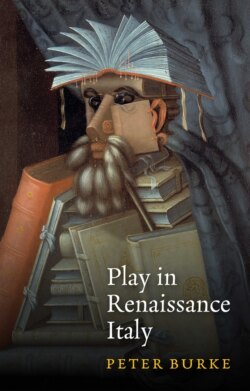Play in Renaissance Italy

Реклама. ООО «ЛитРес», ИНН: 7719571260.
Оглавление
Peter Burke. Play in Renaissance Italy
CONTENTS
Guide
List of Illustrations
Pages
Dedication
Play in Renaissance Italy
Preface
1 Introduction
What is Play?
The History of the History of Play
2 Fun and Games
Outdoor Games4
Indoor Games
Competition
3 Laughter
Wordplay
Visual Play
Humour in Action
Aggression: The Dark Side of Laughter
4 Play: For and Against
Criticizing Play
Defending Play
The Serio-Comic
5 Who, Where and When?
Professionals
Amateurs
The Clergy at Play
Women at Play13
Child’s Play
Play Groups
Playgrounds
Seasons of Play
Carnival
6 New Trends
The Counter-Reformation Campaign
The Age of the Baroque
Codification and Separation
7 Epilogue: Beyond 1650
The Invention of Leisure
Five Trends
Dramatis Personae
Further Reading
Index. A
B
C
D
E
F
G
H
I
J
L
M
N
O
P
R
S
T
U
V
W
Z
POLITY END USER LICENSE AGREEMENT
Отрывок из книги
‘Let’s joke, but seriously’ (scherzare, sì, ma seriamente)
In memory of Umberto Eco, playful scholar
.....
In the Middle Ages, only a few of these terms were in use, among them buffone, derisione, diletto, diporto, giocare, ludere, recreazione, solazzo, spasso, svagare (‘to amuse’) and trastullo (‘pleasure’). A witty saying was already described as a motto, while to produce one was known as motteggiare. In the fourteenth century, the writer Giovanni Boccaccio used the words beffa, festevole (‘light-hearted’), piacevole (which meant ‘witty’ as well as ‘courteous’), scherzare, trastullare (‘to deceive’) and trattenimento, (‘entertainment’).
If texts are to be trusted (since they usually lag behind speech), the number of words available to describe forms of play expanded in the fifteenth and sixteenth centuries. In the fifteenth century, we find baia, a synonym for beffa; canzonare (‘to joke’); ciurmare (‘to deceive’); furbo (‘trickster’) – a term still common in Italy, with a positive meaning; ludicro (‘funny’); mottevole (‘witty’); scherzo (‘joke’); stravagante (‘over the top’); and uccellare (‘to fool’).
.....